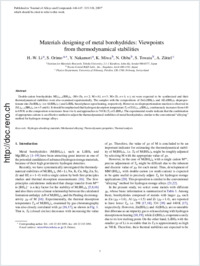Materials designing of metal borohydrides: Viewpoints from thermodynamical stabilities
- Li, H.-W. Institute for Materials Research, Tohoku University, Sendai, Japan
- Orimo, S. Institute for Materials Research, Tohoku University, Sendai, Japan
- Nakamori, Y. Institute for Materials Research, Tohoku University, Sendai, Japan
- Miwa, K. Toyota Central R+D Labs., Inc., Nagakute, Aichi, Japan
- Ohba, N. Toyota Central R+D Labs., Inc., Nagakute, Aichi, Japan
- Towata, S. Toyota Central R+D Labs., Inc., Nagakute, Aichi, Japan
- Züttel, Andreas Physics Department, University of Fribourg, Switzerland
-
12.03.2007
Published in:
- Journal of Alloys and Compounds. - 2007, vol. 446-447, p. 315-318
English
Double-cation borohydrides MLim−n(BH₄)m (M = Zn, n = 2; M = Al, n = 3; M = Zr, n = 4; n≤ m) were expected to be synthesized and their thermodynamical stabilities were also examined experimentally. The samples with the compositions of ZnLi(BH₄)₃ and AlLi(BH₄)₄ disproportionate into Zn(BH₄)₂- (or Al(BH₄)₃-) and LiBH₄-based phases upon heating, respectively. However, no disproportionation reaction is observed in ZrLim−4(BH₄)m (m = 5 and 6). It should be emphasized that hydrogen desorption temperature Td of ZrLim−4(BH₄)m continuously increases from 440 to 650 K as the composition m increases from 4 to 6, and approaches to 740 K (Td of LiBH₄). The experimental results indicate that the combination of appropriate cations is an effective method to adjust the thermodynamical stabilities of metal borohydrides, similar to the conventional “alloying” method for hydrogen storage alloys.
- Faculty
- Faculté des sciences et de médecine
- Department
- Département de Physique
- Language
-
- English
- Classification
- Physics
- License
-
License undefined
- Identifiers
-
- RERO DOC 9074
- DOI 10.1016/j.jallcom.2007.02.156
- Persistent URL
- https://folia.unifr.ch/unifr/documents/300724
Statistics
Document views: 163
File downloads:
- pdf: 372
